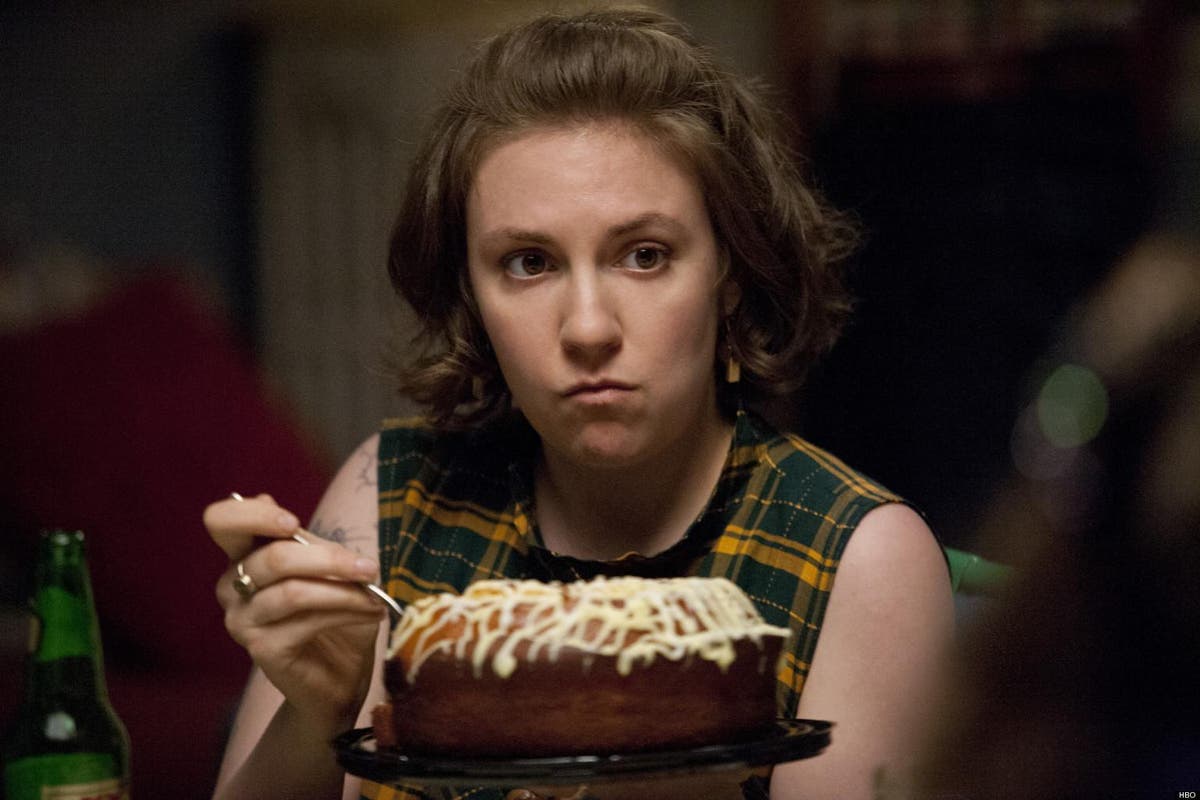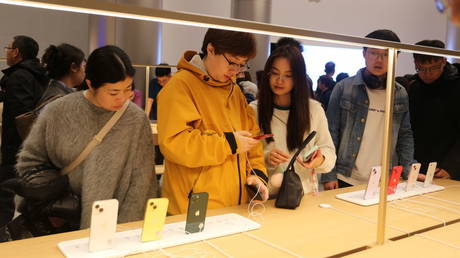About Lena Dunham’s Fashion Line
Earlier this week, Lena Dunham released her small collection for a plus-size brand I had never heard of called 11 Honoré. The collection was 5 pieces, which included a skirt with a scalloped hem, a matching blazer, an oversized yellow shirt, a dress with a handkerchief hem, and a white tank top. Definitely not my … Continue reading About Lena Dunham’s Fashion Line →

Earlier this week, Lena Dunham released her small collection for a plus-size brand I had never heard of called 11 Honoré.
The collection was 5 pieces, which included a skirt with a scalloped hem, a matching blazer, an oversized yellow shirt, a dress with a handkerchief hem, and a white tank top. Definitely not my style, as I generally do not do Working Girl Twee, and pretty far outside of my price range. (The tank top, which is a Rayon/Spandex blend, is $98. Objectively, this is a lot for a tank top that is not from, say, a noted high-end designer.) I saw the new collection, clicked on a link to check it out, and promptly stopped looking at it when I saw the overview of the pieces. I moved on with my day.
However, when I logged into Instagram, there was MASS OUTRAGE over her line. My feed and Stories, which are full of fat folks, fat influencers, and various fat activist types, were aghast that her line only went up to size US 26. HORRORS!
So, here the thing: I wear a size US 28. I’m just outside of the size range for Lena Duhman’s collection. And I’m also at the top of the range for general plus-size retail. Lots of retailers that carry plus sizes max out at a size 26, and often a size 24. (For instance, Anthropologie’s plus-size line theoretically goes to a 26 but I’ll eat my hat if you can ever find it in stock on their website!) I’m grateful that I can still fit into (online-only) options from most stores that carry plus-sizes and some retailers that primarily serve straight sizes that have plus-sizes shoved into a dark alley on their website. But I’m never shocked when a new line or brand doesn’t carry my size. In fact, I am more shocked if I learn that they do. So, to me, an actual woman who cannot fit into Lena Dunham’s collection of 5 pieces, this barely registered. It wasn’t even a blip. (And, to be honest, I didn’t even check to see if anything came in my size once I saw the thumbnails. Thanks, I’m good!)
But I saw the outrage build and build. All day long, people were slamming Lena Dunham for not being “truly inclusive” in her sizing. And there were also people celebrating her public flagellation as a victory.
I got the feeling that this was not actually about the clothes very quickly.
The People vs. Lena Dunham
Lena Dunham is a popular punching bag for a lot of people. If she puts on her shoes and steps out in public for even a second, people are quick to remind you that she is Problematic.
And I do get it, to a degree. She was born into the cloistered world of galleries and artists in New York City. Her first movie, Tiny Furniture, was funded by her parents. (It also featured their impossibly-gorgeous apartment in New York City.) She’s also the cultural offspring of women like Prozac Nation author Elizabeth Wurtzel, who are chronically controversial, constantly putting their feet in her mouths, oversharing to a degree that makes us cringe. She seems very intent on being a Difficult Woman. She even has a podcast called The C Word where she and her cohost “take you on a historical deep-dive into the life of a woman society dismissed by calling her mad, sad, or just plain bad.” Her HBO series, Girls, featured an entire cast of characters who are very hard to like. So thoroughly devoted is Lena Dunham to Difficult Women that the fact that her characters being awful, self-obsessed, self-unaware people was central to the show flew right over many people’s heads. The character she played, Hannah Horvath, was not meant to be sympathetic. She was a complicated, flawed, messy character who never seemed to be able to say, wear, or do the right thing, or be self-aware to not say things out loud that would have been better left in her head. And Dunham, in the show, mined the depths of these characters’ backstories, families, their struggle to finally Get Things Right. In the finale, Hannah struggles to meet the needs of her infant son. She flails and whines and complains and it is not until the very last moment of the entire series that Hannah has a moment where her needs are not the center of her universe.
So, I do get it, but I want to assure the word that Lena Dunham is clearly more intentional about her work and her public persona than you might think.
Yes, she responded by criticism that there was not enough racial diversity in Girls by casting Donald Glover as Hannah’s Black Republican boyfriend named Sandy. And, yes, she wrote a ridiculous fight where Hannah basically criticizes him as a race traitor for being a Black Republican after he delivered negative feedback on a short story of hers that she couldn’t handle. Sandy fully dresses her down (“Oh, I’m a white girl, and I moved to New York and I’m having a great time, and, oh, I’ve got a fixed-gear bike, and I’m going to date a black guy and we’re going to go to a dangerous part of town,” he mocks in a riff that was largely improvised by Glover) and then rejects her offer to have post-break up sex and it was painful to watch. Lena Dunham is difficult.

She has done and said Problematic things. That is part of the point of Lena Dunham.
Lena Dunham is also someone who has been on the receiving end of a landslide of fatphobia, even though she wasn’t fat. She was pear-shaped and a little fleshier than we were used to seeing on television, and received both hatred and praise for it. She often appeared nude on Girls. At the time, she was lifted up as being “body positive” because she simply existed in her body.

But Lena Dunham herself has never really claimed body positivity, to my knowledge. In her book, Not That Kind of Girl, there are lists of food she’s eaten, which the recorded in a journal and then published in a book. She write about her struggles with her body as she grows, keenly aware that her figure is very different than her tall, willowy mother and sibling. Even in Girls, Hannah, is fixated on being slightly larger than her thin friends.

Accompanying the release of her collection, Lena Dunham gave an interview to the New York Times. The contents of this article were the likely source of the rage at her fashion line.
In the article (which is titled “Lena Dunham and the Spanx Liberation Movement,” your first clue that this is not going to go well for people hoping she delivers a body positive message), she talks a lot about her weight gain and her feelings about it. After getting coronavirus, her doctor said the virus affected her pituitary gland and cause “adrenal insufficiency.” She started taking steroids. And she told the NYT: “Not the cool kind that make you muscular. Just the kind that make your face fat. I’m trying to roll with that. Trying to be chin positive. I can deal with anything, but a triple chin is a hard place to land.”
She goes on to criticize the body positivity movement: “The thing that’s complicated about the body positive movement is it can be for the privileged few who have a body that looks the way people want to feel positive. We want curvy bodies that look like Kim Kardashian has been up-sized slightly. We want big beautiful butts and big beautiful breasts and no cellulite and faces that look like you could smack them on to thin women.” I mean, as someone who has seen hourglass shapes and thin faces be prioritized and represent “fat women” and body positivity for years now, she’s… not wrong.
She continued: “I have a big stomach, I always have. That’s where I gain my weight — especially after early menopause, I have a straight-up gut, like an old man — and that’s not where anybody wants to see flesh. It’s not like if I posted a sensual nude of myself on Instagram, people would be marveling at my beautiful derrière.” As someone who also has a big stomach, and has seen how people react to hourglass-shaped women versus the rest of us, once again, she isn’t wrong here.
And then she makes a joke about eating a sandwich. Which offended some folks, but, I make jokes like that all the time. I recently told a joke on a call at work where we were talking about soccer, and I mentioned that I played as a kid as a goalie. “I was great at it because I’m very good at taking up space!” And we all laughed. Self-depricating humor is both a weapon and a defense-mechanism. You’ll find it all over this blog. I deploy it often. If I were giving an interview where I talked about my weight, and happened to be eating a sandwich, I’d make the same joke. Because, well, it’s kinda funny, right?
But, regardless, this interview plus the information that her line stops at a size US 26, was enough to kick the hornet’s nest. And, oh boy, did those hornets come for her.
Given that Lena Dunham had the “body positive icon” label thrust upon her (due to the fatphobia that has made having or displaying any body outside of the Hollywood norm “brave” and “disruptive”), and has not actively participated in that movement, and has publicly addressed her poor body image over and over, there is nothing in anything she said that is surprising. Like the body positive community’s shock and horror when Lizzo did a juice cleanse, this feels like a case of being upset that we can’t cash checks she never wrote to us. Lena Dunham never promised us fat liberation or body positivity.
There is also an element of ableism is some of the critique of Lena Dunham. For many people on the larger end of the size spectrum, our relationships with our bodies can be fraught, because it’s hard to feel great about your body all the time when it represents a barrier to living your full life and accessing spaces and medical care. And for those among us (myself included) who gained a significant amount of weight due to medication, or an illness, or an injury or disability… well, it can take a while to work through our feelings about our bodies and the weight gain. Lena Dunham is chronically ill. Before COVID-19 and steroids, she spent most of her life dealing with debilitating endometriosis. She got a hysterectomy at 31 years old and was kicked into early menopause. People also criticized her essay about that experience, claiming that her own lived experience of endometriosis, decision to have a hysterectomy, and feelings about it all were harmful to other people with endometriosis. It’s a hell of a thing, to be told that your experience of your own body is incorrect or mistaken or harmful. The wave of criticism directed at Lena Dunham for not having the correct feelings about her own (again, chronically ill) body and her weight gain (again, caused by her brush with a deadly virus and a lifetime of medical issues that were serious enough that she insisted on having an organ removed from her body) was strong, as if the barrier for entry to having a plus-size clothing line is ticking boxes on a body positivity scale.
I never cease to be amazed that we simultaneously admit that the world is constructed to exclude fat people, strongly discourage weight gain, and praise thinness as a virtue, while we insist that people with unruly bodies who don’t conform to the mainstream idea of what a body should look like are nevertheless expected to pull ourselves up by our bootstraps, ignore the haters and systemic oppression, and love our fat rolls and “triple chins.” And we demand that of others even as we struggle to reach Body Love Nirvana ourselves. Unconditional body positivity for thee but not for me.
Now, am I arguing that Lena Dunham is the real victim here? Of course not. She’s talented, successful, privileged, and has many deals with many different companies. She’ll be fine. But I am troubled by what these controversies that blow up online reveal about us. And I think with this one, in particular, the people picking up their pitchforks are fighting the wrong fight.
Fashion as Accessibility
I’m not a particularly fashionable person. I spend most of my time in jeans, a t-shirt, and a hoodie or cardigan. I have exactly three dresses I pull out if I need to look fancy. I have never cared about being a fashion plate. Frankly, that was not an option that was available to me for most of my life. I am old enough to remember when Torrid was a small plus-size section on the Hot Topic website. I spent my younger years wearing men’s clothing, and when that was no longer a viable option, I tried to cobble together a wardrobe from Fashion Bug Plus, Hot Topic’s band t-shirts, and occasionally Lane Bryant. So, I never developed much of an interest in fashion because it was a challenge to find clothing that fit me, much less reflected a personal style. I didn’t have a style, I had a uniform.

Even now, as an adult woman with a disposable income and an array of (mostly online) options, I don’t care a whole lot. I want to look put-together. I have cultivated a sort of Tech Bro, But Make It Fat style, because my uniform is similar to the uniforms of programmers who wear hoodies and jeans every day, but that was an accident. I want to be able to dress appropriately for occasions. That’s about it.
I am more concerned with utility than style, which I know sets me apart from the plus-size fashion bloggers who were the source of much of the outrage at Lena Dunham for her collection. I do care a little about how things look, but I am mostly concerned with functionality. And, on that front, plus-size fashion has a long way to go.
For instance, 2019 was the first year in my adult like that I had ever had a warm winter coat. It was an olive green parka with a faux fur hood. I cried when I put it on: It was honest-to-god warm, it even had cuffs to keep the cold air from blowing up my sleeves! I had not a warm coat since childhood. The options available to me, even in recent years, were thin, unlined jackets that looked like winter coats but were designed to not add bulk. And, look, if you’re going to keep someone warm in a coat, you’re going to add bulk. But the priority of most retailers was not to keep plus-size customers the warm. It was to offer a coat-adjacent item that would prevent them from looking fatter. So, for my entire adult life, I wore these non-coats and just froze.
I have a hard time finding shoes. Some fat people are able to just find shoes and wear them, but many of us have fat feet too. I also have wide feet (my paternal family has been passing down our Flintstone Feet for generations) and a very high arch/instep. There are wide width shoes available, but they’re limited for women. Things like waterproof boots for the snow and the rain? Those aren’t available in widths that fit me. As a result, I am terrified of slipping when it’s wet or snowy outside, because my shoes weren’t made for any terrain but the indoors.
To me, fashion is a matter of accessibility. We are generally required to wear clothing, and we have a society that insists on certain types of clothing for certain occasions. You cannot, for instance, wear sweatpants to a job interview. You cannot go to a wedding in leggings and t-shirt. You can’t go to the office in your pajamas. Sometimes you also need to go outside when it’s cold, when it’s rainy, when it’s snowing, when the ground is muddy. So, in order to have access to these occasions, these spaces, the outside world, fat people need to have clothing. And fat people deserve to have functional clothing that fits them. And to adorn ourselves is a such a fundamentally human thing to do, that it’s also important that there be options, so fat people can choose what they wear and express ourselves as well. Shutting us out of fashion and not providing clothing options for us limits our access to the world, to experiences, to other people, to humanity. It gets worse as you go up in the size range – there are some fat people who can’t find clothing to fit them, period.
Everyone is always fighting to get me access to some luxury celebrity clothing line and no is fighting for fat people to have, like, coats. Where are the hornets for L.L. Bean, Columbia, and North Face for not carrying larger sizes? Why does no one seem to care that so many fat people, especially larger fat people, can’t find shoes to fit them? Where’s the fire for the fact that nearly all of our options are online-only, so if we need to grab an outfit quickly for a job interview, we’re screwed? Accessories are often not built for us – the larger you are, the more likely you are to have fat fingers, a fat neck, fat wrists. Things like rain coats, pants that aren’t leggings, shoes, boots, coats, even swimsuits… they often simply aren’t offered to us. But no one seems to care outside of taking swipes at a company, a brand, or a person we already don’t like.
Consider the fact that the same week Lena Dunham drew the ire of the plus-size fashion community, body positive icon Gabi Gregg (known online as Gabi Fresh) launched her latest collection on Swimsuits for All. Where does the sizing stop? 26. A commenter on her Instagram post how we can convince the company to make swimsuits above a size 24. Her response? “Keep asking!”

Now, it’s worth noting that Gabi’s line stops at a 26, but that her sizing chart indicates they run small. She noted in the comments section of a separate post that most people size up. So, a 26 runs closer to a 24, and a 24 runs closer to a 22, and so on. A plus-size influencer who is known for calling out brands for not being size-inclusive enough on Twitter has a swimsuit line and put the onus back on her fat customers who cannot buy her products to “keep asking” the company for larger sizes. HOW ABOUT YOU ASK, Gabi. How about you use your clout and relationship with the company in question to encourage them to expand their sizes. No? Okay then.
Interestingly, many of the same people who slammed Lena Dunham were either silent about Gabi’s line, or even praised it. It’s almost as if…. the furor over Lena Dunham’s collection was not actually about including us at all.
If it were about us, people wouldn’t be targeting a luxury celebrity clothing line with only five pieces that are well out of the price range most of us can afford. They’d be beating down the doors of other stores that provide basic things, demanding that they increase their sizing and offer options to people above a size US 26. They’d be fighting for warmer coats, non-stretchy pants, work/office attire, wider shoes. Instead, they compile lists of indie brands who will sell you color-blocked wide-leg gaucho pants or a linen sack for the same price as a Lena Dunham tank top. Instead, they send us links to Universal Standard (so many links to Universal Standard, when they had the nerve to release this absolute horror show of ruffles and flowers and bad memories of crying in Lane Bryant dressing rooms), and ask us if we’ve tried Torrid or Walmart or Woman Within. They care, but only a little bit. Only when it’s convenient. The rest of the time, they just remind us that we do have options! Here are 4 websites where you can buy clothes! See? Now hush and use my affiliate link to purchase something on this website that also doesn’t carry your size! Like, comment, and subscribe!
To be perfectly honest, people fighting for my right to wear Lena Dunham’s clothing line felt a bit like people getting mad that a burning building was not accessible to me. No thank you! I’m fine! But how about getting me access to this other store? No? Okay then.
The manufactured outrage of plus-size influencers who are not excluded by Lena Dunham’s collection (or many others) taking up this cause and accusing her of capitalizing on the fat community, when it is their literal job as plus-size influencers to capitalize on the fat community and try to get plus-size people to buy things, is… well, I’ll be honest, it doesn’t feel good. And controversies like this one drum up engagement on their social media accounts, which creates a more hospitable environment for them to sell us on their brand (themselves) and direct us to buy things that they take a small commission on. It feels more like an argument about who has the right to advertise to us, this company or this other company, a plus-size blogger or Lena Dunham. Folks like me, we get sold to all the time, day and night, but no one ever really includes us or asks us what we want or need (hint: it is not a scalloped miniskirt for $138) or what they can do to make fashion, clothing, the world, more accessible for us. And that’s fine, I suppose, we’re used to being invisible or underserved. But when you use us as a reason to criticize someone you don’t like, for the purposes of social media engagement and building your own brand or publishing a think piece, maybe stop and ask us if this is something we want? If this is activism we need and/or want?
I mean, if anyone had asked me if I wanted them to fight like hell to get Lena Dunham to expand the sizing on her line, my response would have been, “Nah, I’m good!”
But, again, this wasn’t actually about ethics in plus-size fashion.
One Man’s Trash
There are lot of people my size and larger who disagree with me, I’m sure. I am cranky and cynical and tired. (More than anything, a girl is tired.) And there may be people out there who absolutely loved Lena Dunham’s line and would love to be able to purchase items from it in their size. There are people out there who love dresses and bows and ruffles, too.
But that’s the thing here. It’s not about one brand, one person, or even a consensus about What Fat People Want. (I mean, besides sandwiches. We obviously want sandwiches.) It’s about choice. It’s about the ability to go into a store and find items in your size that you actually want to wear. It’s about going to Loud Bodies’ website and going “OH GOD NO THANK YOU” and then being able to find a comfy pair of jeans, t-shirt from your favorite band, and a new hoodie to wear that makes you feel like yourself. It’s about being able to ask for advice about clothes without people screaming HAVE YOU HEARD ABOUT UNIVERSAL STANDARD at you so loud that you scream and hide under your bed. It’s about never having anyone tell you, “Sometimes, if you stand on one leg and jump and down three times during a full moon, you can find your in-store size at Target.” It’s about having a warm coat when it’s cold out, a swimsuit when it’s hot and you want to go for a dip in a pool, shoes to put on your feet when you want to go outside in a variety of weather conditions. It’s about accessibility. And accessibility is largely about options – having the option to go to particular place, having the option to wear a particular thing, having the option to sit here or sit there, or being able to turn around and go somewhere else if you don’t like the option right in front of you. Options are freedom. And right now, people over a certain size don’t have many options. That’s the problem. It’s also a problem that people keep talking about us up here at the larger end of the size spectrum as if we are a hive mind, instead of a diverse individuals who have one thing in common with each other.
So, this is a lot of stink over five items of clothing. Maybe some people want access to them, I don’t know. And maybe pushing this one celebrity and this one little collection will be the magic key that unlocks the door between fat people and fashion and unleashes a smorgasbord of new options for us. Probably not, but who knows.
What I want is for people to push when it’s not convenient for them. I want them to start pushing brands that don’t serve fat people at all. I want options. And, just for a little bit, I’d like to stop being advertised to if people are going to sell me anything I want. I’d like for people to stop yelling at Dunham in one breath and telling us about how sad it is that Khloe Kardashian is so insecure she wants to sue the whole entire internet to remove a photo of her she doesn’t like, have some compassion, it is very hard to be a Kardashian.
And I’d also like for people to understand that if you want to take a stand against fashion collabs that are not size inclusive enough you need to bring that stand to everyone equally, even if it means you need to kill your darlings.

 admin
admin 

























